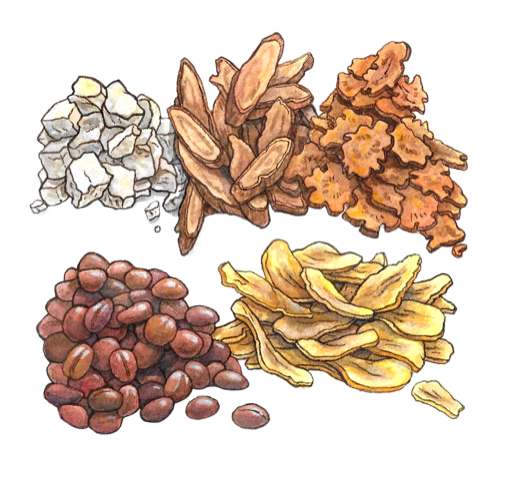
Common Names
- Suanzaoren
- Semen Ziziphus Spinosae
- Ziziphus
- Sour Jujube Decoction
- Ziziphus Decoction Formula
- Tabellae Suanzaoren Tang
For Patients & Caregivers
Tell your healthcare providers about any dietary supplements you’re taking, such as herbs, vitamins, minerals, and natural or home remedies. This will help them manage your care and keep you safe.
Suan Zao Ren Tang (SZRT) is a traditional Chinese medicine (TCM) formula. It’s made up of five different herbs.
SZRT is used to:
- Treat insomnia (trouble falling asleep, staying asleep, or waking up too early)
- Lower anxiety (strong feelings of worry or fear)
Talk with your healthcare providers before taking herbal formulas. They can interact with some medications and affect how they work. For more information, read the “What else do I need to know?” section below.
Side effects of SZRT can include:
- Sleep disruption
- Dizziness
- Dry mouth
- Skin rash on face
- Urinary urgency
- Constipation (difficult or infrequent bowel movements)
- Diarrhea (loose or watery bowel movements)
- Fatigue (feeling more weak than usual)
- Lethargy (feeling less energetic)
- Sweating
- SZRT may increase the drowsiness effects of some prescription medications so talk with your healthcare provider before taking it.
For Healthcare Professionals
Suan Zao Ren Tang (SZRT) is a traditional Chinese medicine formula with a centuries-long history of use as a treatment for insomnia. Described in the TCM classical text Jin Gui Yao Lue (Essential Prescriptions from the Golden Cabinet), SZRT consists of five herbs: Suan Zao Ren (Sour Jujube seed), Fu Ling (Poria mushroom), Chuan Xiong (Sichuan Lovage root), Zhi Mu (Anemarrhena root) and Gan Cao (Licorice root). SZRT is the most commonly prescribed formula for managing insomnia in Taiwan (1).
Clinical studies of SZRT have been largely conducted in Asian populations. In a randomized controlled trial of adults with chronic insomnia, adjuvant use of SZRT with Lorazepam led to greater reductions in insomnia severity index with fewer side effects compared to Lorazepam alone. The combination reduced anxiety as well, although there were no significant between-group differences in depression scores. Participants also reported higher physical functioning at 12 weeks (2). Findings also indicate SZRT to be comparable to diazepam in improving anxiety and sympathetic symptoms (19), and concurrent use of a modified SZRT formula with paroxetine reduced anxiety in patients with generalized anxiety disorder (20).
In another study of methadone-maintained patients with disturbed sleep, SZRT affected significant improvements in patient-reported sleep quality and efficiency compared to placebo. However, there were no significant between-group differences in anxiety and depression scores or heroin craving (3).
Additionally, an observational study found SZRT to enhance daytime functioning in climacteric women with poor sleep quality. Of note, women with severe menopause rating scale (MRS) scores had greater improvements compared to those with mild/moderate MRS scores (4).
Among cancer patients with insomnia, modified SZRT formulas affected significant reductions in fatigue and insomnia severity index (5), and anxiety scores (6). A population-based study found SZRT to be positively associated with 5-year survival in breast cancer patients (21).
A systematic review/meta-analysis determined that SZRT confers short-term benefits in individuals with sleep disturbance or insomnia. The improvements in sleep quality were significantly greater compared to placebo or waitlist control with comparable effects to benzodiazepine or cognitive behavioral therapy (CBT) (7). Future trials are needed to better delineate SZRT’s effects by reducing heterogeneity of trial participants (those with insomnia or inconsistently defined sleep disturbance), to determine its long-term effects, as well as efficacy in diverse populations.
- Insomnia
- Anxiety
The mechanisms via which SZRT exerts its biological effects are not fully known. Findings from pharmacological studies indicate that its bioactive components including jujubogenin, jujuboside A, and jujuboside B enhance sleep activity by stimulating serotonin and GABA (the major inhibitory neurotransmitter in the central nervous system) receptors (8) (9) (10) (11).
Spinosin, another constituent of SZRT, was found to increase total sleep time and reduce sleep latency in pentobarbital-treated rats (12).
Another study indicates that SZRT relieves insomnia likely by modulating the neuroactive ligand-receptor interaction, serotonergic synapse, and PI3K/AKT pathway (22).
None known.